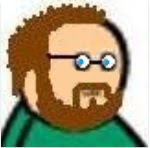April A-to-Z: must-read books
Ender’s Game (1985)
by Orson Scott Card
(1951-) USA
The American political anti-terrorism
action-drama debacle I’d previously read did nothing to prepare me for the very
significant collection of insights Card would reveal in novels Ender’s Game and (even more so) in the
sequel. Dynamite stuff in terms of morality and the psychologies of war, tribal
structures and the developing minds of youth, which can only be properly
explored in this sci-fi speculative world, free of our North American blinders
and prejudices. What a wonderful surprise. Add some wildly inventive ideas
around biological evolution and society and human socio-political structure and
this is simply the best brand of sci-fi around. A rather stunning achievement
which all becomes far more evident in book two: Speaker for the Dead.
I found it challenging to relate to the
main characters or to understand why they had to be so young. I wanted to
imagine them as young adults but I must trust Card’s priorities. He clearly
knows what he’s doing. His intelligence is apparent.
This is a must read for any youth or
adult with any use at all for sci-fi or anyone remotely open to giving the
genre a chance. And if you’ve seen the Ender’s Game movie which touches on book
one only, do not let it stop you. The film amounts to a vacuous teaser trailer
for the book which runs a thousand times deeper and yet doesn’t even compare to
book two. If you’ve yet to see the movie though, for goodness sake, wait. Don’t
let it spoil the book’s powerful climax. And whatever you do, don’t cheat
yourself by reading Ender’s Game without going on to Speaker for the Dead.
Ender’s Game is primarily a critical prologue to the real tale.
A passage:
“I thought you were my friend.” Despite himself, Ender’s voice trembled.
Graff looked puzzled. “Whatever gave you that idea, Ender?”
“Because you—” Because you spoke
nicely to me, and honestly. “You didn’t lie.”
“I won’t
lie now either,” said Graff. “My job isn’t to be friends. My job is to produce
the best soldiers in the world. In the whole history of the world. We need a
Napoleon. An Alexander. Except that Napoleon lost in the end. And Alexander
flamed out and died young. We need a Julius Caesar, except that he made himself
dictator, and died for it. My job is to produce such a creature, and all the
men and women he’ll need to help him. Nowhere in that does it say that I have
to make friends with children.”
“You made
them hate me.”
“So? What
will you do about it? Crawl into a corner? Start kissing their little backsides
so they’ll love you again? There’s only one thing that will make them stop
hating you. And that’s being so good at what you do that they can’t ignore you.
I told them you were the best. Now you damn well better be.
“Look Ender, I’m sorry if you’re lonely and afraid. But the buggers are out
there. Ten billion, a hundred billion, a million billion for all we know. With
weapons we can’t understand, and a willingness to use those weapons to wipe us
out. It isn’t the world at stake, Ender. Just us. Just humankind. As far as the
rest of the biosphere is concerned, we could be wiped out and it would adjust, it
would get on with the next step in evolution. But humanity doesn’t want to die.
As a species we have evolved to survive. And the way to do it is by straining,
and straining, and every few generations, giving birth to genius. The one who
invents the wheel. And light. And flight. The one who builds a city, a nation,
an empire. Do you understand any of this?”
Ender
thought he did, but wasn’t sure, and so said nothing.
“No, of
course not. So I’ll put it bluntly: Human beings are free until humanity needs
them.”
Ender’s Game (1985)
Speaker for the Dead (1986)
Xenocide (1991)
Children of the Mind (1996)
Ender’s Shadow (1999)
Shadow of the Hegemon (2001)
Shadow Puppets (2002)
First Meetings (2002)











































No comments:
Post a Comment